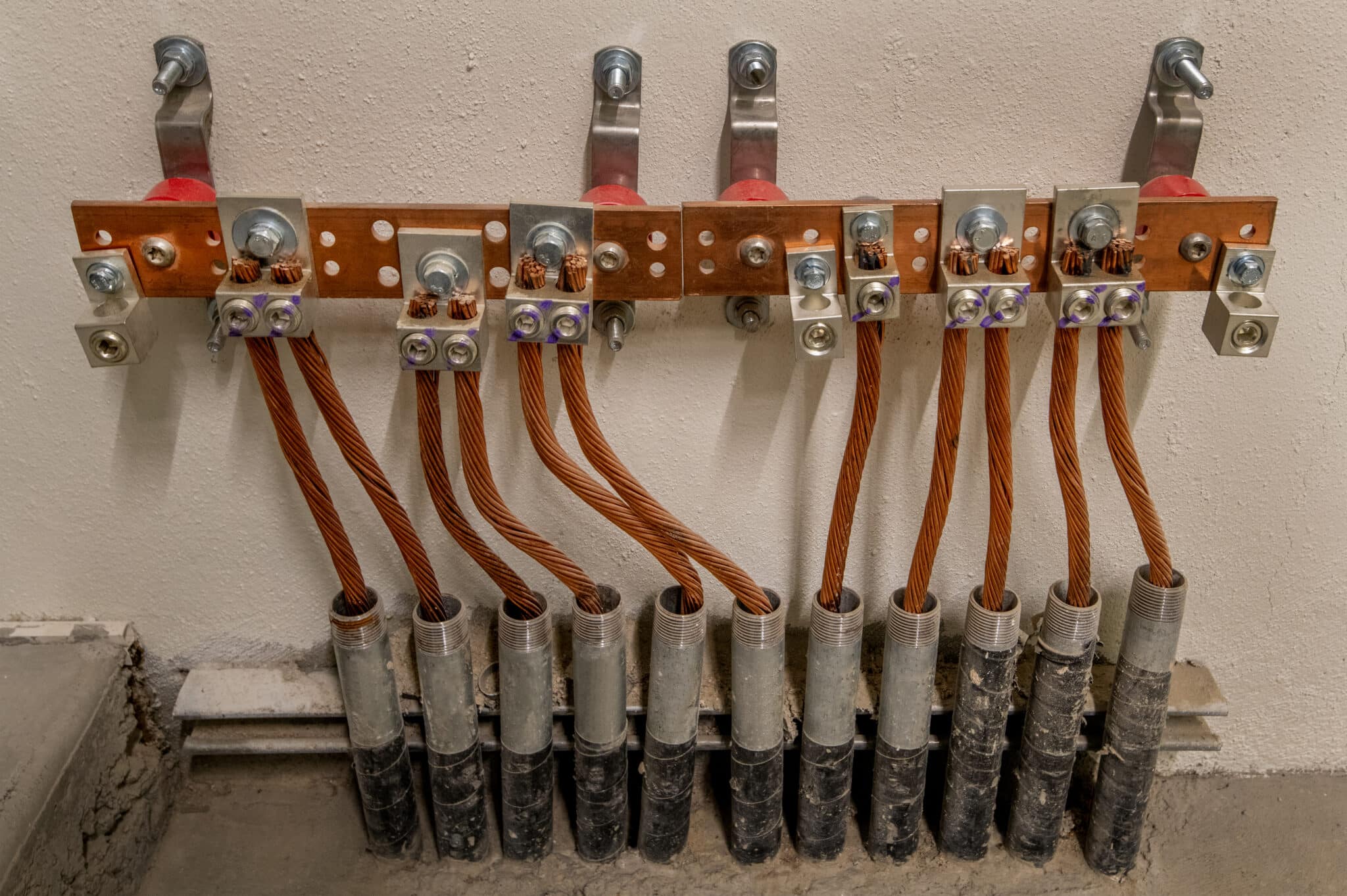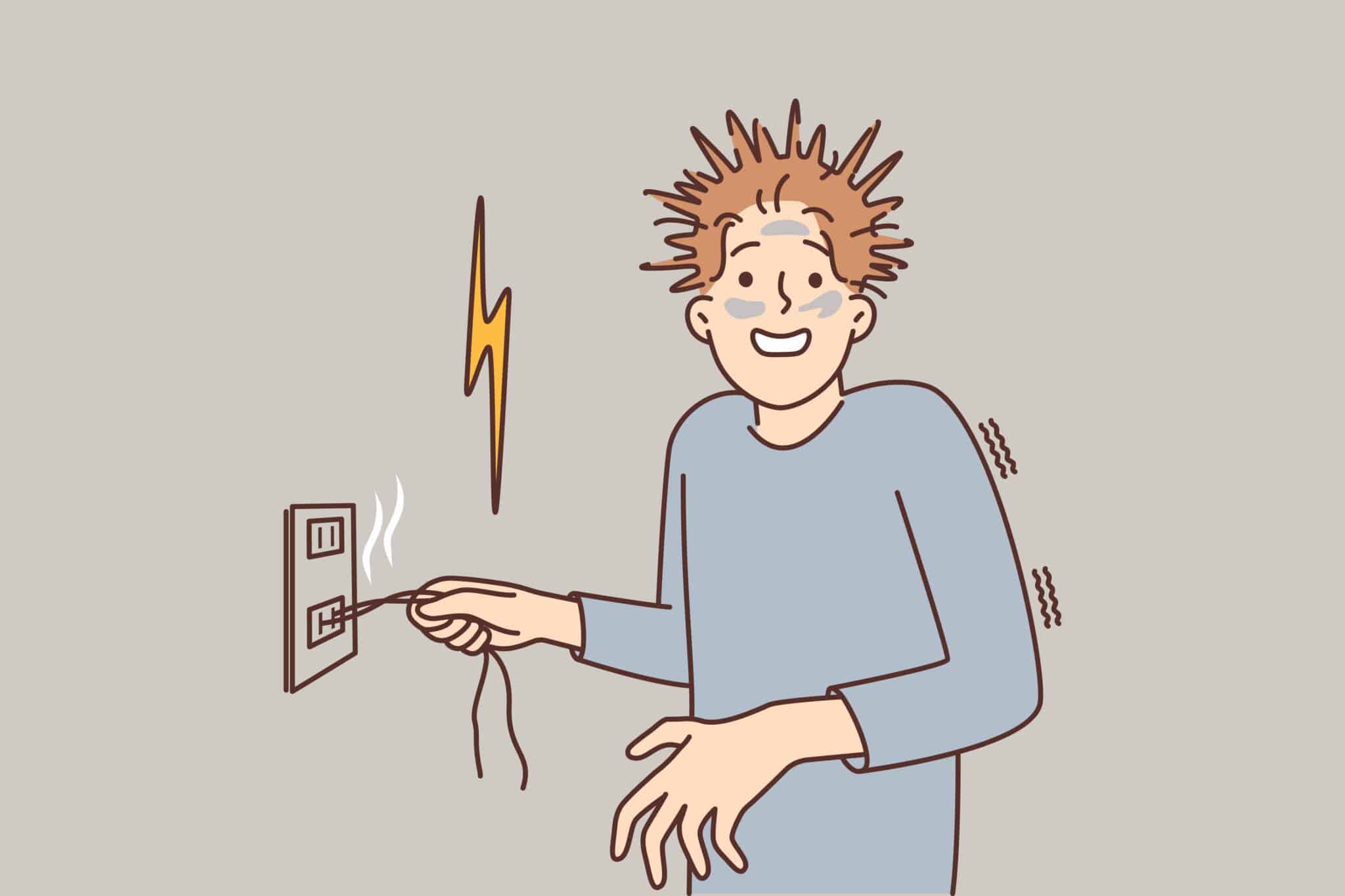Have you ever wondered what keeps your home’s electrical system safe and efficient? Electrical grounding is the unsung hero that protects your home from electrical shocks and surges.
Whether you live in Katy, TX, Richmond, TX, or beyond, understanding electrical grounding can help you ensure the safety of your home and loved ones. In this blog, we’ll break down the basics and importance of electrical grounding in a simple, easy-to-understand way.

What is Electrical Grounding?
Electrical grounding means connecting the electrical system to the earth. This process creates a safe pathway for excess electrical energy to travel, preventing shocks and other dangers. Think of it like giving electricity a safe exit route in case things go wrong.
Importance of Electrical Grounding in Homes
Grounding your electrical system is not just a technical requirement; it’s essential for your safety and the proper functioning of your home’s electrical appliances.
Without grounding, your electrical system is at risk of causing electrical shocks or even fires. Grounding helps protect both you and your electrical devices from unexpected electrical surges and ensures that everything runs smoothly.
How Electrical Grounding Works
Electrical grounding works by providing a direct path for electrical current to follow in case of a fault or surge. Imagine your home’s electrical system as a network of roads.
Grounding acts like a safe highway that directs any excess electricity straight into the ground, preventing it from causing harm to your home and appliances. This safe path helps to prevent electrical shocks, fires, and damage to your devices.
Types of Electrical Grounding
Grounded Conductor (Neutral)
The grounded conductor, often referred to as the neutral wire, is a critical part of your electrical system. It carries electricity back to the power source, completing the circuit.
This ensures that electrical devices can function properly and safely by providing a return path for the current.
Grounding Electrode System and Grounding Electrode Conductor
The grounding electrode system involves components like rods or plates that are buried in the ground. These elements are connected to your home’s electrical system through the grounding electrode conductor.
This setup ensures that any stray electrical currents are safely dissipated into the earth, preventing shocks and electrical fires.
Equipment Grounding Conductor
The equipment grounding conductor is responsible for providing a safe path to the ground for electrical appliances and fixtures.
This wire connects all your electrical devices to the grounding system, ensuring that in the event of a fault, the excess electricity is safely directed away from your home and into the ground. Important aspects include:
- Connection to Electrical Devices: Ensures all appliances are safely grounded.
- Safety Path: Provides a route for excess electrical energy to escape.
Understanding these components and types of electrical grounding helps ensure your home remains safe, efficient, and protected from electrical hazards.
Benefits of Proper Electrical Grounding
Safety: Preventing Electrical Shocks
One of the most important benefits of electrical grounding is safety. Grounding provides a path for excess electricity to travel safely into the earth. This reduces the risk of electrical shocks, which can occur when electrical systems or devices malfunction.
By grounding your electrical system, you protect yourself and your family from potentially dangerous electrical accidents.
Protection of Electrical Appliances and Devices
Grounding helps protect your valuable electrical appliances and devices from damage. Electrical surges, which can be caused by lightning strikes or power outages, can fry the circuits of unprotected devices.
With proper grounding, these excess currents are safely directed away from your appliances, extending their lifespan and saving you from costly repairs or replacements.
Stabilizing Voltage Levels
Grounding also plays a crucial role in stabilizing voltage levels in your electrical system. It helps maintain a consistent voltage level, ensuring that your electrical devices receive a steady and reliable supply of power.
This consistency is important for the efficient operation of sensitive electronics, such as computers and home entertainment systems, which can be damaged by fluctuating voltage.
Common Electrical Grounding Methods
Grounding Rods
Grounding rods are one of the most widely used methods for grounding electrical systems. These rods, typically made of copper or galvanized steel, are driven deep into the ground.
The rod provides a direct path for electrical currents to disperse into the earth. This method offers an effective grounding solution for most homes, ensuring safety by redirecting excess electricity away from the living spaces.
Grounding Plates
Grounding plates are another method used, especially in areas where the soil conditions make it difficult to drive grounding rods. These metal plates are buried in the ground and connected to the electrical system.
They provide a large surface area for the electrical current to dissipate. This ensures effective grounding in challenging soil conditions, offering an alternative where rods may not be practical.
Grounding Grids
A grounding grid consists of a network of interconnected conductors buried in the ground. This method is often used in larger installations, such as industrial facilities or substations.
The grid provides multiple paths for the electrical current to follow. This ensures robust and reliable grounding, handling higher electrical loads efficiently and providing extensive protection against electrical faults.
Grounding Using Water Pipes
In some older homes, metal water pipes are used for grounding. The pipes are connected to the electrical system, providing a path for electrical current to travel into the earth.
However, this method is less common today due to the increased use of plastic pipes, which do not conduct electricity. Modern standards typically recommend more reliable grounding methods to ensure safety and compliance with current electrical codes.
How to Check if Your Home is Properly Grounded
Visual Inspection Tips
A simple visual inspection can help you identify if your home has a grounding system in place. Here are a few things to look for:
- Grounding Rods: Check outside near your electric meter or main service panel for metal rods driven into the ground.
- Grounding Wires: Look for copper or green-coated wires connected to these rods or to metal water pipes.
- Ground Connections: Ensure that all major appliances, like your HVAC system and water heater, have grounding wires connected to them.
Using a Multimeter to Test Grounding
A multimeter is a handy tool that can help you test your home’s grounding system. Here’s how you can use it:
- Set the Multimeter: Switch your multimeter to the voltage (V) setting.
- Test the Outlets: Insert the multimeter probes into the outlet slots. You should see a voltage reading around 120 volts for standard outlets.
- Check Ground Connection: Place one probe into the hot slot (the smaller slot) and the other probe into the ground slot (the round hole). A reading of around 120 volts indicates a good ground connection.
By following these steps, you can get a basic idea of whether your home’s electrical system is properly grounded.

Signs of Poor or Faulty Grounding
Frequent Electrical Surges
If you experience frequent electrical surges, it could be a sign that your home’s grounding system is not functioning correctly. Surges can be caused by issues within your electrical system, such as faulty wiring or poor grounding.
These surges can damage your appliances and electronics, leading to costly repairs. Proper grounding can help prevent these problems.
Flickering Lights
Flickering lights are often a symptom of electrical problems, including poor grounding. If your lights flicker or dim unexpectedly, especially when using other electrical devices, this could indicate an unstable electrical supply.
This instability might be due to grounding issues. Addressing these problems can ensure a stable and reliable electrical system.
Electrical Shocks from Appliances
Feeling a slight shock or tingle when you touch an appliance is a clear sign of a grounding problem. This occurs when there is a buildup of electrical energy that has no safe path to the ground.
It’s essential to address this issue immediately to avoid serious injury or damage. Ensuring proper grounding can protect you and your appliances from these hazards.
Overheating Electrical Components
Overheating electrical components, such as outlets, switches, and wiring, can be a sign of poor or faulty grounding. When the grounding is inadequate, electrical currents may not flow correctly, causing the components to overheat.
This can lead to burn marks, melting, and even fires in severe cases. Addressing grounding issues can help prevent overheating and ensure the safety and longevity of your electrical system. Proper grounding is essential for maintaining a safe home environment and protecting your electrical components from damage.
Steps to Improve Electrical Grounding in Your Home
Hiring a Licensed Electrician
The best way to ensure your electrical system is properly grounded is to hire a licensed electrician. Professionals have the knowledge and tools to assess your current grounding setup and make any necessary improvements. They can:
- Conduct thorough inspections.
- Identify and fix any grounding issues.
- Upgrade your grounding system if needed.
Upgrading Your Home’s Electrical System
If you live in an older home, it might be time to upgrade your electrical system. Upgrading can involve:
- Replacing outdated wiring.
- Installing new grounding rods or plates.
- Ensuring all major appliances and fixtures are properly grounded.
These upgrades not only improve safety but can also enhance the overall efficiency of your electrical system.
Regular Maintenance and Inspections
Regular maintenance and inspections are key to keeping your electrical system in good condition. Schedule periodic checks with a professional to:
- Inspect grounding connections and components.
- Test the grounding system’s effectiveness.
- Make necessary adjustments to maintain optimal grounding.
By following these steps, you can significantly improve your home’s electrical grounding, ensuring a safer environment for you and your family.
Electrical Grounding in New vs. Older Homes
Grounding Standards Over the Years
In older homes, grounding practices were not as stringent as they are today. Many older homes might rely on outdated methods, such as grounding through metal water pipes.
Modern standards, however, require more robust and reliable grounding methods to ensure safety.
Retrofitting Older Homes for Better Grounding
Retrofitting older homes to meet current grounding standards is crucial for safety and functionality. Here are some steps involved in upgrading an older home’s grounding system:
- Inspection: A licensed electrician will assess the current grounding setup and identify any deficiencies.
- Upgrading Components: This may involve installing new grounding rods, upgrading the main service panel, and ensuring all circuits are grounded.
- Rewiring if Necessary: In some cases, older wiring may need to be replaced to comply with current standards.
Upgrading the grounding system in older homes not only brings them up to current safety standards but also improves the overall reliability of the electrical system.
Electrical Codes and Standards for Grounding
National Electrical Code (NEC) Guidelines
The National Electrical Code (NEC) provides comprehensive guidelines for electrical installations, including grounding. These guidelines are updated regularly to reflect new safety standards and technological advancements. Key NEC requirements for grounding include:
- Grounding Electrode Systems: Proper installation of grounding rods, plates, or grids.
- Bonding: Ensuring all metallic parts of the electrical system are connected to prevent potential differences.
- Grounding Conductors: Specifications for the size and type of grounding conductors used in the system.
Local Building Codes and Regulations
In addition to the NEC, local building codes may have additional requirements for grounding systems. These regulations can vary by location, so it’s important to be aware of the specific codes in your area. Local codes often address:
- Inspection Requirements: Regular inspections to ensure compliance.
- Installation Practices: Specific methods and materials allowed for grounding.
- Permits and Approvals: Necessary permits for installing or upgrading grounding systems.
Following both national and local codes ensures that your grounding system meets all safety and legal requirements.
DIY vs. Professional Electrical Grounding
Risks of DIY Grounding
While it might seem tempting to handle electrical grounding yourself, there are significant risks involved. Incorrect grounding can lead to serious safety hazards, including electrical shocks and fires.
Additionally, DIY projects might not meet NEC or local code requirements, potentially resulting in fines or the need for costly corrections.
Proper grounding requires a thorough understanding of electrical systems, which most homeowners typically lack. Attempting DIY grounding without the necessary knowledge and skills can result in serious safety issues and additional expenses.
Benefits of Hiring a Professional Electrician
Hiring a licensed electrician ensures that your electrical grounding system is installed correctly and safely. Professionals have the training and experience to handle all aspects of electrical grounding.
They ensure that your system meets all NEC and local code requirements, providing peace of mind. Professional installation includes thorough testing and inspection to guarantee a safe and effective grounding system.
By choosing a professional, you protect your home and family from the risks associated with improper grounding.
Ensure Your Home’s Safety with The Local Electrician!
Is your home’s electrical system properly grounded? Don’t take any chances with safety. The Local Electrician offers expert electrical grounding services in Katy, TX, and Richmond, TX.
Our licensed professionals will ensure your home is protected from electrical hazards. Contact us today at 346-483-7150 for an appointment and peace of mind knowing your home is safe and secure.
FAQs
What is the purpose of electrical grounding?
The purpose of electrical grounding is to provide a safe path for excess electrical current to travel into the earth. This helps prevent electrical shocks, fires, and damage to electrical devices by ensuring that any stray electricity is safely directed away from your home.
How can I tell if my house is grounded?
You can tell if your house is grounded by conducting a visual inspection for grounding rods or wires near your electrical panel and major appliances. Additionally, using a multimeter to test your outlets can confirm if your grounding system is functioning correctly.
What happens if my home is not properly grounded?
If your home is not properly grounded, you risk electrical shocks, fires, and damage to your appliances. Poor grounding can cause electrical surges to travel through your home’s wiring, leading to potentially dangerous situations and costly repairs.
Can I ground my home electrical system myself?
While it is technically possible to ground your home electrical system yourself, it is not recommended due to the risks involved. Incorrect grounding can lead to serious safety hazards. Hiring a licensed electrician ensures that your system is installed safely and meets all code requirements.
Why is grounding important for my appliances?
Grounding is important for your appliances because it protects them from electrical surges and spikes. Proper grounding ensures that any excess electricity is safely directed into the earth, preventing damage to your appliances and extending their lifespan.
What are the signs that my home might have grounding issues?
Signs that your home might have grounding issues include frequent electrical surges, flickering lights, electrical shocks from appliances, and overheating electrical components. If you notice any of these symptoms, it is essential to have a professional electrician inspect your home’s grounding system.
How often should I have my home’s grounding system inspected?
It is recommended to have your home’s grounding system inspected by a licensed electrician every few years, or immediately if you experience any signs of grounding issues. Regular inspections can help identify and address potential problems early, ensuring the safety and reliability of your electrical system.




























